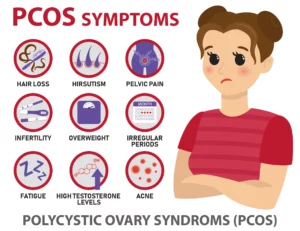PCOS Awareness: Breaking Misconceptions and Understanding Symptoms

September marks PCOS (Polycystic Ovary Syndrome) Awareness Month, an opportunity to challenge the misconceptions surrounding this hormonal disorder affecting millions of women globally. It is characterized by a combination of symptoms related to hormone imbalances, primarily involving elevated levels of androgens (male hormones) and insulin resistance.
PCOS manifests through a variety of symptoms that extend beyond irregular periods. Many women experience heavy, prolonged bleeding, which can lead to iron deficiency and anaemia, causing dizziness and weakness. Weight gain and fatigue are common due to insulin resistance and hormonal imbalances. Additionally, elevated androgen levels can result in acne, excess facial and body hair (hirsutism), and thinning hair or male-pattern baldness. Women with PCOS may also face sleep disturbances, including sleep apnea, and mental health challenges like mood swings, anxiety, and depression, making it a complex condition that affects both physical and emotional well-being.
Most of these symptoms are often misunderstood, leading to stigma and emotional distress.

Misconception 1: “Weight Gain Is Due to Poor Choices”
One of the biggest myths is that women with PCOS are overweight due to poor diet or lack of exercise. In reality, weight gain in PCOS stems from insulin resistance—a common feature of the condition that makes losing weight difficult, despite a healthy lifestyle.
Misconception 2: “Fatigue Equals Laziness”
Fatigue, a common yet overlooked symptom, is often dismissed as laziness. Women with PCOS experience chronic tiredness due to insulin resistance and hormonal imbalances. This fatigue makes daily life more challenging, reinforcing damaging stereotypes.
Misconception 3: “PCOS Is Just About Periods”
PCOS is often mischaracterized as only affecting menstrual cycles. While irregular periods are a hallmark, PCOS can also cause acne, excess hair growth, and even fertility challenges. It is a multi-faceted condition affecting both physical and mental health.
Misconception 4: “PCOS Means Infertility”
While PCOS can affect fertility, it doesn’t mean infertility. With proper medical care, many women with PCOS can conceive, though they may need assistance managing their reproductive health.
The exact cause of PCOS is not fully understood, but it is believed to involve a combination of genetic and environmental factors. Management of PCOS typically includes lifestyle changes, medication to regulate menstrual cycles and manage symptoms, and support for associated health issues like insulin resistance and mental health challenges.
Rather than labelling women with PCOS as “lazy” or “unmotivated,” it’s crucial to recognize that these are symptoms of a medical condition. Support systems—both medical and emotional—are vital for those managing the complexities of PCOS.
This PCOS Awareness Month, let’s commit to dispelling myths, offering understanding, and supporting women with the condition. Awareness is key to ending the stigma and promoting empathy.







